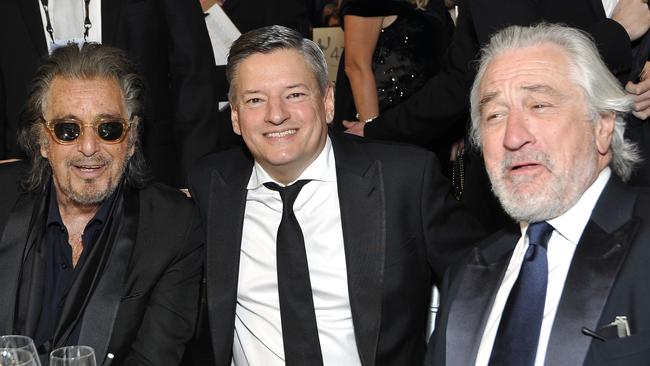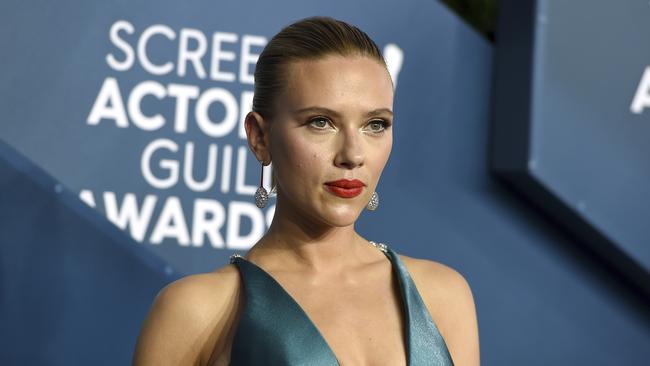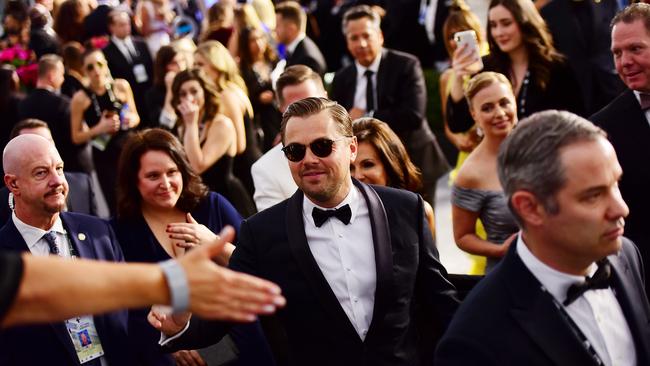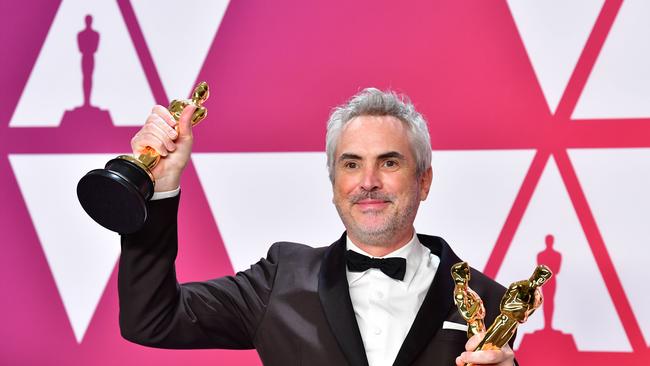Deep pockets fuel a big picture hunt for Netflix at the Oscars
Netflix has spared no expense wooing the Academy’s voters in a desperate bid to buy Oscars glory.

On a single block of Sunset Boulevard, three looming billboards promote Netflix’s The Irishman in quick succession. Local TV stations have run 30-minute infomercials featuring Robert De Niro and Marriage Story star Scarlett Johansson just before prime time. A week-long pop-up museum at the Four Seasons hotel memorialised Netflix’s top awards contenders with a display of props and costumes.

And then there are the star-studded parties at the swankiest venues: among them, two for the Golden Globes, another after the Screen Actors Guild awards, and a holiday bash hosted at chief content officer Ted Sarandos’s Hancock Park home that some attendees said recalled the glitz and glamour of the industry’s golden age.
READ MORE: Oscar nominations split Hollywood | Philippa Hawker talks to Joaquin Phoenix about Joker | David Stratton on Marriage Story | David Stratton on The Irishman
It’s all part of an all-out marketing blitz the streaming giant has rolled out in pursuit of the movie industry’s biggest prize — the Oscars.
Awards season typically takes over Hollywood, but this year has been especially over the top thanks to Netflix. The company’s aggressive and costly tactics have sparked an arms race with other studios that has rival awards strategists and executives reeling — and might even be backfiring against the streamer.
So far, Netflix has been nominated for more awards than other studios but has fallen short when it comes to actually winning. At the Golden Globes, the streamer started the night with 17 film nominations, but went home with only one award, a best supporting actress prize for Laura Dern’s role in Marriage Story. The studio had seven Screen Actors Guild award nominations in movie categories but again only Dern went home victorious. (De Niro, the star of Netflix’s The Irishman, was shut out of nominations for the Golden Globes and the Oscars.)

Netflix hopes to turn this trend around during the Oscars — taking place on Monday, Australian time — the most prestigious awards ceremony of all. It has the most nominations of any studio, with 24 nods across seven movies, including top prizes such as best picture and best director. And it’s using its deep pockets to lobby the Academy of Motion Picture Arts and Sciences’ 9215 voting members on an unprecedented scale.
Industry insiders estimate that Netflix is spending well over $US100m, with the majority of those funds funnelled into campaigns for Martin Scorsese’s The Irishman and Noah Baumbach’s Marriage Story. That’s more than traditional studios, which typically spend between $5m and $20m per movie on awards campaigns.
Netflix’s head of original films, Scott Stuber, says that estimate is too high, and counters that the company’s awards spending has been “very smart”.
“I don’t think we’re doing anything that everyone else isn’t doing,” Stuber says.
But to many others Netflix appears to be investing an extraordinary amount of money into its leave-no-stone-unturned awards strategy. That includes holding screenings in cities where Oscar voters live, no matter how far away they are from Hollywood’s cultural centres — Madrid, Wellington, Sydney, Copenhagen, Tokyo, Berlin and even New London, Connecticut.
With The Irishman, Netflix has released more than two hours of specially produced video extras to go along with three hours of behind-the-scenes podcast episodes in order to promote the nearly four-hour movie. On Netflix’s YouTube channel, it has posted more than 20 videos including cast interviews and featurettes about the making of The Irishman. That’s two to three times more such material than other studios have uploaded for their best picture contenders.
Steering Netflix’s award strategy is Lisa Taback, an Oscar campaign wizard who was a key player during the 1990s glory years of Miramax, the company founded by the disgraced Harvey Weinstein and his brother, Bob. Netflix absorbed her awards-consulting company in 2017, agreeing to pay Taback a seven-figure annual salary. The move not only boosted its team but took a valued consultant away from everyone else.
“They are spending a reservoir of cash on awards and it’s forcing their competitors to reason, ‘We better rustle up bigger budgets or we won’t be in the game’,” says Richard Licata, a former executive at NBCUniversal, Showtime, Fox and HBO who has consulted with Amazon, among others, on awards campaigns.
Netflix’s Hollywood adversaries crying foul over the company’s brash campaigning is partly rooted in envy. While the major studios’ movies are judged by box office results, Netflix is not. Simultaneously, Netflix is scooping up nominations that might have otherwise gone to independent production companies that depend on such accolades to drive ticket sales.
People close to Netflix counter that it has more movies to promote for awards season than other studios, and that its three biggest — The Irishman, Marriage Story and The Two Popes — were also recently released on the service and thus the awards campaigns also serve as marketing to its customers.

Earning a reputation for producing prizewinning movies and shows would have a clear “business benefit” for Netflix, chief executive Reed Hastings recently told Wall Street analysts, adding: “We will win deals we wouldn’t have otherwise won for incredibly entertaining content.”
Extravagant award campaigning is nothing new in Hollywood. Even so, traditional movie studios tend to operate within strict budget limitations, seeking not to erode a film’s profits by overspending on awards campaigning.
Oscar campaign costs tend to mount quickly as studios send out thousands of free DVD “screeners” and fly actors and directors to Los Angeles, New York and London for screenings with Q&As, some of which are followed by lavish receptions where filmmakers can schmooze with voters.
But Netflix, some say, is taking it to the next level. “Streamers can rewrite the rules in all-or-nothing marketing tactics, in instances where traditional studios may need to take a more measured approach to ad dollars,” says Rebecca Mall, a senior marketing executive at William Morris Endeavor, who joined the agency last year from Paramount, where she was co-president of marketing.
The novel economics of subscription streaming means Netflix can justify spending more on awards and consider it part of the overall marketing effort for a movie that will live on its service indefinitely. For a traditional movie studio, awards campaigning is usually an extra cost, on top of advertising for a movie’s theatrical run, which is often over by the time the awards season rolls around.
The altogether dizzying pace of the awards season and Netflix’s ambitious campaign is unfamiliar territory for Al Pacino, who received an Oscar nomination for his acting in The Irishman.
The 79-year-old actor says catching his breath between the many events he’s attended promoting the film has been essential. “They let you rest,” he says jokingly.
But it’s unclear if it will pay off. Last year, stewarded by Taback, Netflix ruffled feathers lobbying hard for its one best picture contender, the black and white, Spanish-language film Roma. Marketing consultants estimate that the company spent more than $25m to promote the movie, likely surpassing the film’s $15m production budget. Roma won best director but not best picture.
The arms race spurred by Netflix, with rivals trying to keep pace, has meant academy members have been inundated with marketing material and invitations to exclusive events.
“I had this cascade of FedEx envelopes full of screeners at my door,” says screenwriter Anthony McCarten, an Oscar voter nominated this year for his work on The Two Popes.
Some Academy members, however, have welcomed the crowded campaign season; a social calendar full of potential outings. As one long-time member put it: “The rest of the year I don’t have a goddamn thing to do.”
THE WALL STREET JOURNAL
